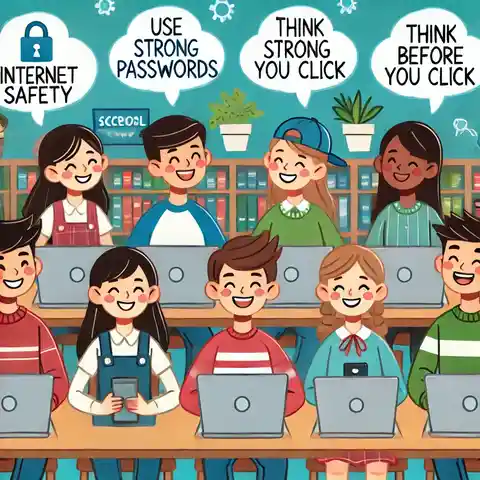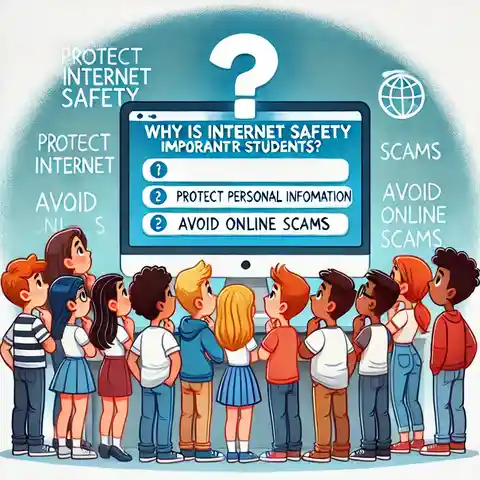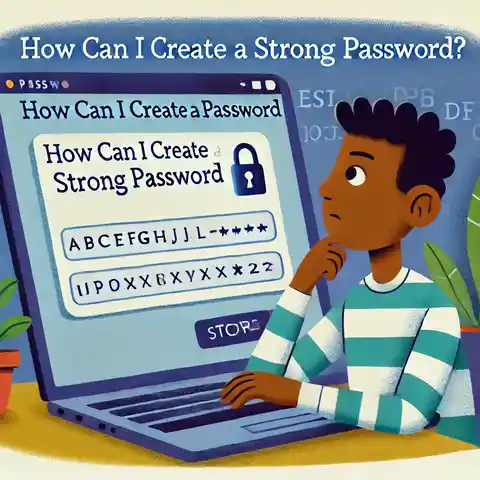Internet safety tips for students:
10 Internet Safety Tips for Students
If you are a student, then the internet is all around — much of your life probably revolves around it. Studying, communicating with friends, and endless entertainment. But if you know how to protect yourself on the internet, then it is not a problem any more and you can do all of these without even worrying. It is crucial that students learn about internet safety.
What students can do is learn so they enjoy all the greatness available on internet but without getting into trouble. This article will show you how to stay safe on the internet and not make mistakes.
Internet Safety Tips for Students

Follow these easy tip and keep yourself protected online.
Keep Your Information Private
Do not give out your full name, home address or phone number (any girl will have these), or the location of your school online.
-
Turn on your privacy settings: Change who can see what you post to ‘friends only’ ( #facebookprivacy)
-
Don’t Act impulsively: If you upload something online, then it might be there forever.
Use Strong Passwords
Keep your accounts secure with secure passwords A Combination Of Letters, Numbers, And Symbols
-
Change Passwords: Change them every so often.
-
Keep passwords close: Never share or write them down in a public place.
Watch Out with Your Clicks
Links that are not safe to click Others may direct interested users toward harmful websites or introduce viruses.
-
Check links: ensure the website seems authentic before clicking.
-
Say No To Pop-Ups: Never click on pop-up or mysterious hyperlinks.
Use Secure Websites
Be aware of the security on a website before sharing any personal information. Check for the presence of “https://” with a padlock icon.
Be Careful What You Do Over Public Wi-Fi: While public Wi-Fi is dangerous for online shopping
Be Aware of Cyberbullying
Cyber bullying is a term for mean things people say online. Things happen, and you know that another one of them occurs to a friend.
-
How to Handle a Cyberbully: Do Not Reply: Block and Tell an Adult
-
Right proof: Screen shots if shown to an adult
Think Before You Download
Downloads can be risky. Some files have viruses.
-
Use Safe Sites: Always download from a trusted website or an app store.
-
Scan for Viruses: Before you open the files, use your antivirus software to check them.
Online Friends Won’t Tell You
The people you meet online may not be who they claim to be. Be wary when seeking new friends.
Never Give Out Address and Phone Number
They Had Better Meet in Public: Just kidding 🙂 If there was a silver lining, maybe dad should take you to an adult chaperoned event or 21+ location if and only when the two of you feel comfortable doing so.
Log Out of Public Computers
Stay with Binance: If you are using the same device, you must be connected for security reasons
Clear Browsing Data: Delete History and Cookies.
-
Be Skeptical of Free Offers
-
Be careful with free offers. They can be scams.
Do Not Click on Free Offers Links: It may steal your information or damage the device.
Inspect Offers: Verify that the apps exist.
-
Talk to a Trusted Adult
-
If you are ever unsure or uncomfortable about something online tell an adult.
Why is student internet safety important?

This is why internet safety matters — here are some of the reasons:
Personal Information Protection: Students may be currently required to share personal details such name, address or mobile number while online.
-
Protects From Online Scams: The internet can be a great place with lots of fun and useful websites, but it is also filled full for traps that prey on unsuspecting people. This one can be a commonplace amongst scams, and it is dangerous in the sense that those making up these scams are essentially trying to take your money or personal information. One such thing is Internet safety that, if included in the school curriculum can educate students about how they should identify as a scam and not fall into it.
-
Protects against Cyberbullying: In clear terms, Cyberbullying is an evil use of the internet to hurt others. That can be with messages, emails or social media.
-
Avoids Strangers: When youre on the internet, anyone can pretend to be something theyre not. They may try to befriend students and gleam personal information or cause harm. Remember what we all of us used to be told, when using the internet: Keep your details safe; do not share personal information with someone that is a stranger to you.
-
Encouraged usage: The internet is a good place for both learning and fun but should be used sensibly.
It does help them figure out how to make internet work for them well.
What should I do if I receive a mean message online?
Here’s what you should do:
-
Don’t Respond: The time you spend replying might just make things worse.
-
Get the Person Blocked: Use this report to block profile and no more message can be sent from that account anymore.
-
Report It to an Adult: Take the message and share it with a parent, teacher or other adult you trust.
Remember, it is not your fault if someone treats you poorly online.
How can I create a strong password?

Here are some tips:
- Mix characters: Be sure to include upper case, lower case letters along with numbers and special symbols like “! or “#”.
- Never Use Well-Known WordsAs already mentioned, “password123” is just as bad of an idea.
- However if something is easy to crack you can try Make It Long: The longer your password the harder they will normally be for other people to guess. More than 8 characters are better.
- Regularly Changing Passwords: To secure your accounts, update the passwords every few months.
Think of a strong password as the lock on your door that keeps people out who shouldn’t be in.
Meeting Online Friends IRL Safe?
Meeting online friends irl can be kinda sketch….honestly who know what they could really look like…??? Here’s how to stay safe:
- Tell a Safe Adult: You should consider informing your parents if you want to meet somebody from the internet. But they can at least help you in determining if it is correct.
- It is safer if you do meet up in a busy, public place and make sure your bring an adult that can be trusted with you.
- Do Not Walk Alone: You must be accompanied by an adult.
Take a wise precaution by keeping yourself safe when you meet online friends.
What Is Cyber-bullying, And How Can I Stop It?
Here’s how to stop it:
- Do Not Engage: Do not engage with the bully. Engaging will help incentivize them to keep going.
- Block/Ban: Bans the bully on that app or website. The more recent ones have a report for behavior feature.
- Save Evidence: Take screenshots or messages as your evidence. If you do need to report the bullying, this may be of use.
Cyber-bullying is not okay. And if it happens to you, always tell a trusted adult.
How can I trust a website?

Here’s what to look for:
- Try searching for “https://” -: well established websites starts with https instead of http. The “s” stands for secure.
- Look for a Padlock Icon A padlock in the address bar indicates that the website is secure.
- Stay Away from Odd Sites: If you find a site that looks weird or has countless pop ups, it is most likely not the safest place.
- Never enter your personal information into non-secure websites.
What Are Phishing Emails? — 8 Warning Signs
What are the signs that an email is a phishing attempt?
- Threatening or Scary Messages: Will state your account is going to be deleted if you do not act right now.
- Poor spelling and grammar: A majority of phishing emails contain mistakes that can make them appear unprofessional.
- Unknown Senders: You should never open emails from unknown senders.
- Strange Links: If an email has weird links. Do not click on them! Move your mouse over that link to view where it goes
Beware of emails that request personal information.
Is it safe to shop online on public Wi-Fi?
Here’s why:
- Public Wi-Fi Is Insecure: Public networks are a wide-open door for hackers to spy on you.
- Use Your Mobile Data: When it comes to something like online shopping, use your phone as a mobile hotspot instead and keep the bank balance in check.
- Hold Out until Home: It is best to hold off doing any banking online that accounts to your funds unless one going through a safe, non-public system.
Your protection is more important than the convenience.
How to Handle Malicious Links?
Here’s how to handle them:
- Avoid Clicking: If a link is weird or your not sure where it directs you to, don´t click on it.
- Hover the Link: If possible hover your mouse over a link to get full URL — do this before you actually visit it!
- Get a Second Pair of Eyes: Share the link with your parent or teacher if you are uncertain.
Better safe than sorry when clicking links.
Why should I sign off my accounts in public computers?
Here’s why:
- Keeps Your Privacy: By logging you out of these accounts, no one can use them after using this computer through your session.
- Clears Your Information: This will remove any personal details you input.
- Note: Be mindful when using the “Remember Me” option – only utilize this on your personal devices, never use it in shared/public computers.
Just like we lock our doors, signing out can be your quick step for security.
Every student at least must be aware of the internet security. Students are advised to follow basic rules such as securing personal information, creating strong passwords and not clicking suspicious links. Don’t forget if you see something online that makes you feel uncomfortable or not certain just like in real life, it’s okay to ask for help from a trusted adult.
Being Safe on the Internet means being cautious and watching you click. By following the above safety measures, you can enjoy using the internet and everything that comes with it without putting yourself at risk.


